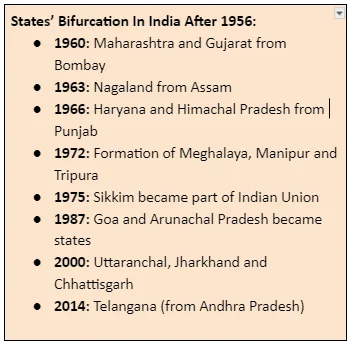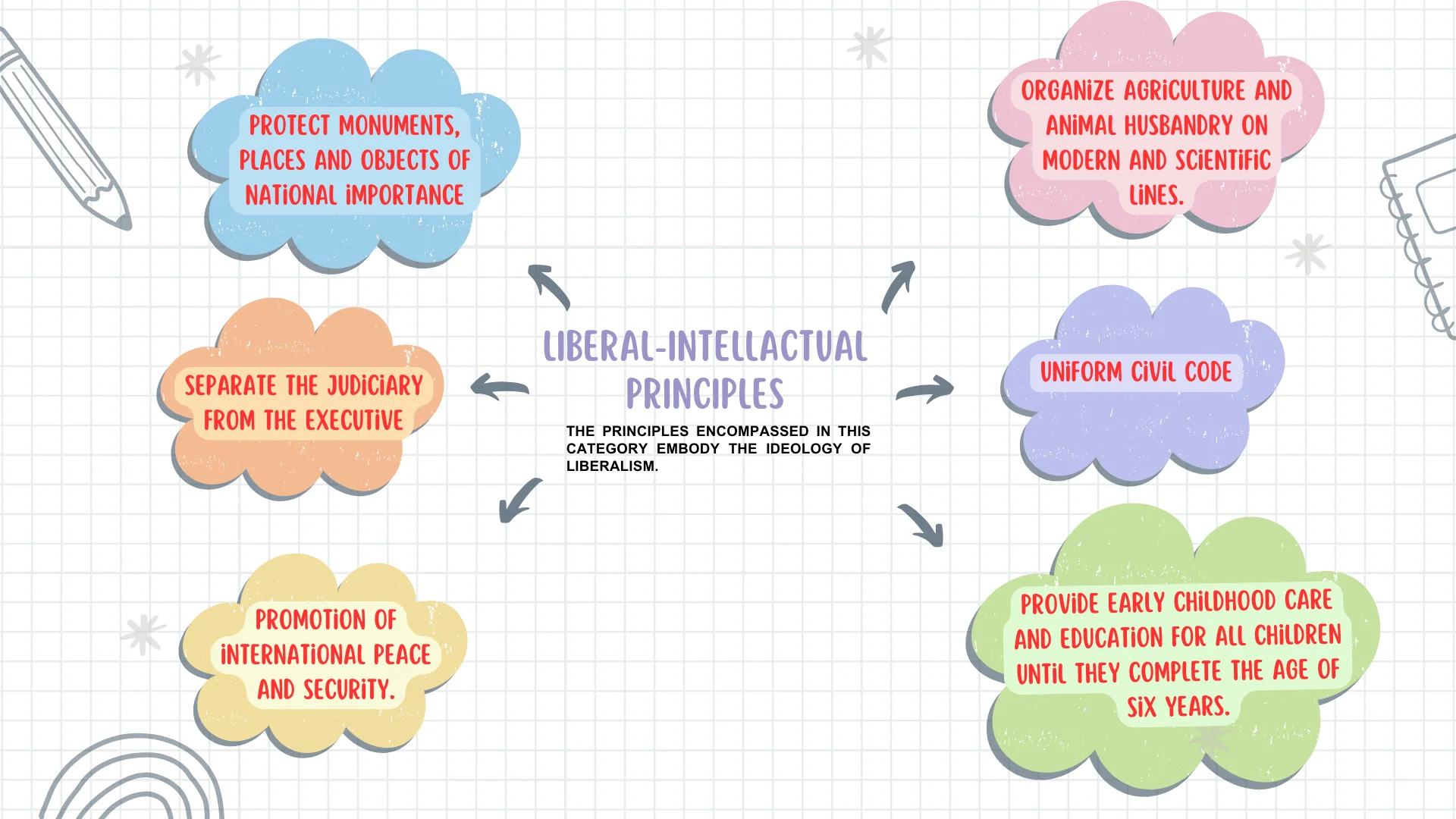The demand for statehood in India has evolved from linguistic and cultural assertions to calls for better governance and economic development. Regions like Vidarbha, Bodoland, and Saurashtra seek separate statehood to address issues of underdevelopment, resource allocation, and political autonomy. As democracy deepens, marginalized communities are increasingly voicing their aspirations for new administrative boundaries and greater autonomy.
Growing Demand for Statehood in Modern India
Evolving Demand for Statehood in Modern India

- Complexity of Modern States: Modern States are large and intricate, with various cultural and economic challenges, and their complexities are compounded by historical experiences.
- Historical Roots of Statehood Demands: Since its independence, India has grappled with demands for separate Statehood, primarily rooted in language, culture, ethnicity, and religion.
- Shift in Justifications for Statehood: Later, the justifications for these demands shifted towards improved governance, greater participation, administrative convenience, and economic viability in addressing the developmental needs of sub-regions.
- Formation of New States in the 21st Century: The early 21st century in India also witnessed the formation of three new States – Chhattisgarh, Uttarakhand, and Jharkhand – and more recently, Telangana achieved separate Statehood.
- Deepening Democracy and Emerging Aspirations: As democracy deepens, so do these aspirations. Previously overlooked sections of the population are recognizing their own significance, demanding new provinces or States, seeking new borders, and striving for autonomy
Enroll now for UPSC Online Course
Various Statehood Demands in India
Bodoland
- The Bodos, the largest ethnic and linguistic community in northern Assam, have long aspired for a separate Bodoland State.
- Their agitation for Statehood culminated in a 2003 agreement between the Government of India, the Assam State government, and the Bodo Liberation Tigers Force (BLTF).
- This agreement granted Bodos the Bodoland Territorial Council (BTC), an autonomous administrative body within the State of Assam under the Sixth Schedule of the Indian Constitution.
Saurashtra
- The movement for a separate Saurashtra State gained momentum in 1972 under the leadership of Ratilal Tanna.
- The region’s lack of adequate water supply, limited employment opportunities, and consequent youth migration have been cited as primary drivers of this demand for Statehood.
- Saurashtra also possesses a distinct linguistic identity that sets it apart from the rest of Gujarat.
Gorkhaland
- Gorkhaland is a proposed State encompassing the Darjeeling hills and Dooars regions in northern West Bengal, inhabited predominantly by the ethnic Gorkha (Nepali) people.
- The Gorkha community has historically sought political autonomy and recognition of their distinct cultural and linguistic identity.
Vidarbha State
- The announcement of Uttarakhand’s formation spurred the demand for Vidarbha.
- Vidarbha is less developed compared to Western Maharashtra.
- The demand for statehood is primarily due to the underdevelopment of the region.
- The States Reorganisation Commission (SRC) recommended the formation of Vidarbha State in 1956, but it was not implemented.
- Districts: Buldana, Akola, Amaravathi, Yavatmal, Wardha, Nagpur, Bhandara, Chandrapur, Gadchiroli
Political Agitation
- Vidarbha Rajya Sungursh Samiti: Mobilizes local political support for statehood.
- Samawaya Samiti: A common platform for politicians advocating for Vidarbha statehood.
Supporters
Janata Dal, Bharatiya Janata Party, and various Republican Party groups.
Opponents
Shiva Sena opposes the formation of Vidarbha.
- Congress also does not support the separation of Vidarbha from Maharashtra.
Factors Fueling Demands for Separate Statehood
- Economic Disparity
- Despite their wealth of natural resources, many of the regions demanding separate Statehood remain economically disadvantaged.
- This disparity often leads to disputes over the sharing and utilisation of these resources with the mother States.
- Declining Significance of Language and Culture: While linguistic and cultural distinctions were once primary justifications for creating new States, these factors have become secondary in many recent cases.
- Local Resource Competition
- Competition for access to local resources, such as water, land, and employment opportunities, has intensified demands for separate Statehood.
- Government Negligence
- Residents of these regions often feel neglected by the government, believing that their concerns are not adequately addressed.
- Economic Stagnation
- The inability of local economies to generate sufficient employment opportunities has exacerbated existing grievances and fueled demands for separate Statehood.
- Popular Mobilisation and Democratic Processes
- Democratisation has empowered marginalised groups to voice their aspirations through popular mobilisation and political channels.
- ‘Sons of the soil’ Sentiment
- A strong sense of local identity, often rooted in the concept of being ‘sons of the soil,’ has fueled demands for greater control over local affairs.
Arguments in Favor of Creating Small States in India
- Better Governance and Administration: Smaller states are easier to manage due to their smaller population and area, leading to improved public services and development.
- More Equitable Distribution of Resources: In smaller states, resources can be more fairly distributed among regions and communities, as there is less competition and the government is more accountable.
- Increased Participation in Democracy: People in smaller states feel more connected to their government and have a greater say in decision-making, encouraging more active participation in democracy.
- Cultural and Linguistic Preservation: Smaller states can better preserve and promote distinct cultures and languages, fostering a stronger sense of identity and belonging.
Arguments Against Granting Statehood to Smaller Regions in India
- Increased Administrative Costs: Creating new states leads to higher administrative costs due to the need for new government institutions.
- Inter-State Disputes: More states can increase competition for resources and territory, leading to more inter-state disputes.
- Loss of National Unity: New states might weaken national unity, as people may identify more with their state than with the country.
- Regional Imbalances: Smaller states may struggle to generate enough resources to sustain themselves, leading to regional imbalances.
Way forward
- Economic and Social Viability: Base decisions on Statehood on thorough assessments of economic and social viability, ensuring the sustainable development of the newly created States.
- Compensation Mechanisms: Establish fair and adequate compensation mechanisms for parent States to mitigate the potential loss of physical and human capital resulting from the creation of a new State.
- Clear Parameters and Safeguards: Implement clear-cut parameters and safeguards to prevent arbitrary demands for Statehood, ensuring that the process is rational, transparent, and aligned with national interests.
- Democratic Concerns as Priority: Prioritise democratic concerns such as development, decentralisation, and effective governance as the primary criteria for granting Statehood, emphasising the welfare of the population.
- Address Fundamental Problems: Simultaneously address fundamental issues like concentration of power, corruption, and administrative inefficiency to enhance governance regardless of Statehood demands.
- A balanced and inclusive approach that considers diverse factors will contribute to the harmonious development of regions seeking Statehood while preserving the unity and integrity of the nation.

Enroll now for UPSC Online Course
| Must Read | |
| Current Affairs | Editorial Analysis |
| Upsc Notes | Upsc Blogs |
| NCERT Notes | Free Main Answer Writing |
Conclusion
To address the growing demands for statehood, it is crucial to assess the economic and social viability of new states, ensure fair compensation for parent states, and implement clear guidelines for statehood.
- Prioritizing democratic concerns like development and effective governance, while addressing fundamental issues such as power concentration and corruption, will foster harmonious regional development and national unity.
Sign up for the PWOnlyIAS Online Course by Physics Wallah and start your journey to IAS success today!
| Related Articles | |
| Direct Democracy in India | Economic Development |
| Population in India | Preamble Of The Indian Constitution |

 GS Foundation
GS Foundation Optional Course
Optional Course Combo Courses
Combo Courses Degree Program
Degree Program









